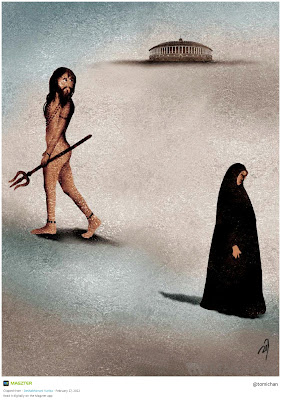 |
| Symbols |
“Are you a good Muslim?” A student asked Ziauddin Sardar.
Ziauddin
Sardar is a writer born in Pakistan and living in England. He is a
multi-faceted personality who has made a mark as a scholar, cultural critic, and
an intellectual who specialises in Muslim thought. [Now don’t ask me whether
Muslims think. Some of them do, I assure you.]
The above
question was hurled at Sardar when he visited a madrasa in Pakistan in 1985.
Let me quote a part of that conversation from his book Desperately Seeking
Paradise. [The quotes are not verbatim.]
Student: Are
you a good Muslim?
Sardar: I am
a Muslim. Good or not, I don’t know.
Student: If
you are a Muslim, why don’t you grow your beard?
Sardar: A
beard is not a necessary mark of a Muslim.
Student: The
beard is an essential part of the Prophet’s Sunnah. Those who disregard the
Sunnah are not good Muslims.
Sardar: Do you
use a camel for your travels? Do you ride on a camel’s back?
Student: What
do you mean?
Sardar: The camel
is Sunnah because the Prophet used the camel for his travels.
Student: But
we have cars and buses today. Why would I use a camel?
Sardar: Exactly. If there was
a safety razor in those days, the Prophet would have shaved off his face hair
too.
All gods and
their scriptures belong to specific periods of history. What the Prophet said
and did in his time is no more valid today than what Jesus or Krishna or the Buddha said
and did in their times. The time has changed. The old gods and their prophets
have become outdated. No scripture can ever be eternally valid. No religion can
make sense to intelligent people unless it adapts itself to the changing times.
Most parts of the Bible and the Koran and the Upanishads or the Gita or any
scripture will be rubbished today by any thinking brain.
If those
ancient and outdated and absurd scriptures continue to rule us today, it is
because we haven’t learnt to think. We are still idiots. We are governed by
idiots who love riots and wars. Idiots who wear fancy dresses. Idiots who want
to capture nuclear stations. Some idiots have teashops to boast about. Some
have Rasputin. Most have a god, one god, their own god, their own ego.
Egos of certain
individuals replace the essential teachings of religions. That is how a religion
dies. The hijab is a symbol. The saffron is a symbol. It is very easy to make
people fight in the name of symbols. Idiotic leaders do just that: make people
fight in the name of symbols.
Tail
question: Why doesn’t the world ever go beyond stupid leaders?
Answer: No
leader can be greater than their people.
Religions are weapons. It achieve different things when different people handles it. Gandhi used to infuse a sanctify any tasks he was doing/he wanted others to practice. The same tool is being used now to deviate people from real time issues by relevant parties.
ReplyDeleteThis post was written in some frustration and so there are exaggerations. Gandhi was a great leader who towered above the masses. But there are so few leaders like him in the entire human history.
DeleteWhere the population doesn't evolve in thinking, past rules them and leaders become their Gods.
ReplyDeleteTrue. We make tremendous progress in science and technology, but not one step ahead in evolved thinking!
DeleteI think having an open mind and access to good education is key when it comes to changing the inert way we think and perceive things
ReplyDeleteThe problem with education is that the educators themselves may be perverse and bigoted!
Delete